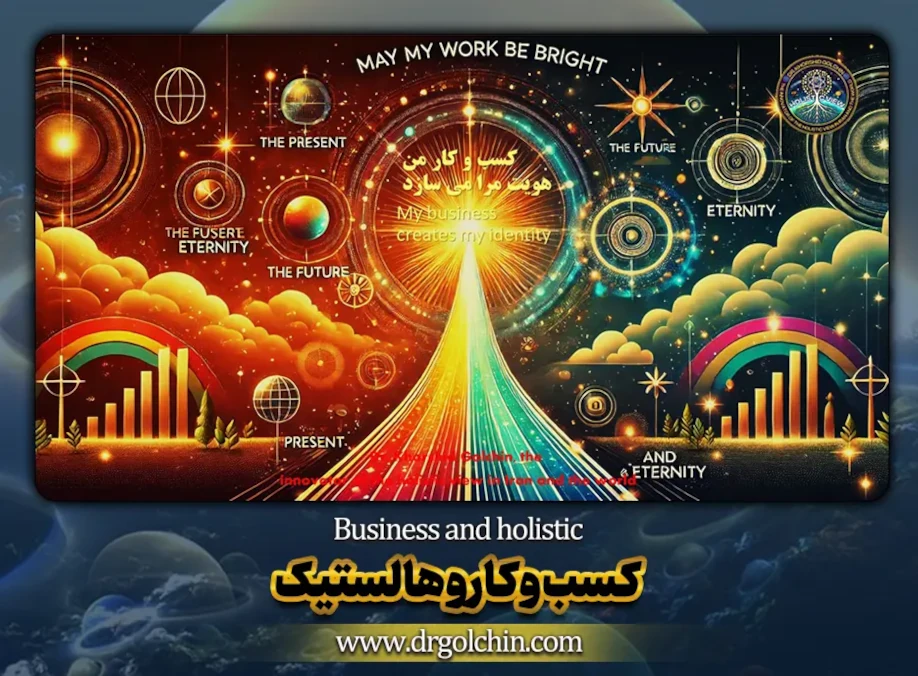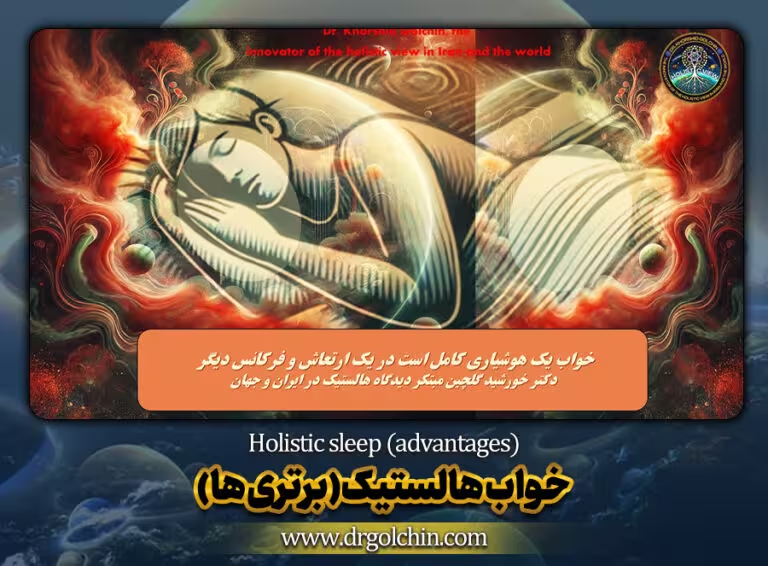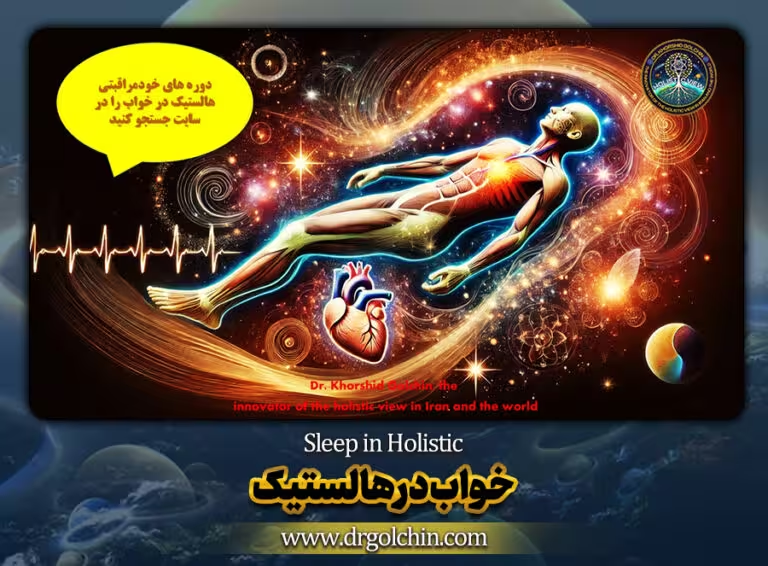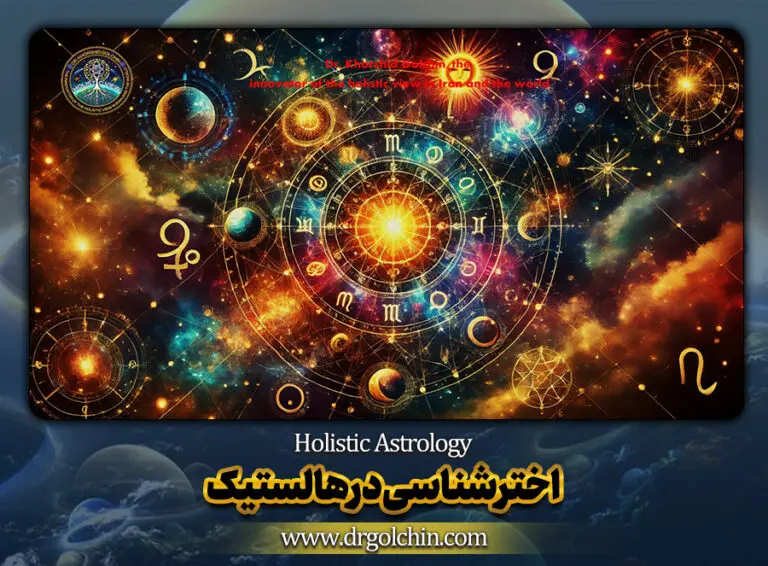کیهان شناسی از دیدگاه هالستیک
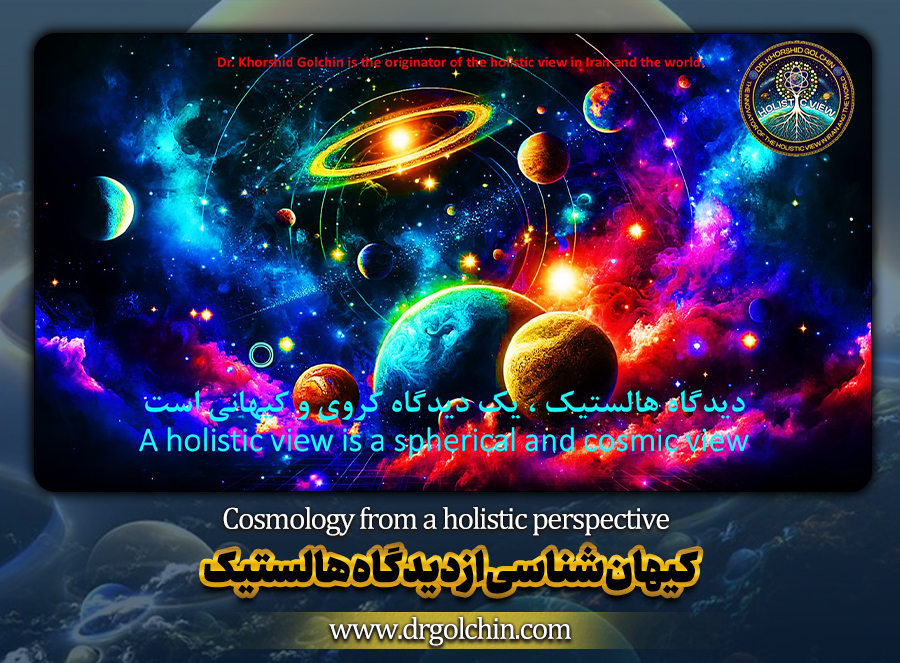
خورشید گلچین هستم مبتکر دیدگاه هالستیک در ایران و جهان ، معتقدم که دیدگاه هالستیک یک دیدگاه کیهانی و کروی است، دیدگاه هالستیک به کیهانشناسی، نگاهی جامع و کلنگر به جهان است که بر ارتباط متقابل و هماهنگی میان تمامی اجزای کیهان تأکید دارد. این دیدگاه، کیهان را بهعنوان یک کل واحد و بههمپیوسته میبیند که تمامی اجزای آن با هم در ارتباط هستند و بر یکدیگر تأثیر میگذارند. از این منظر، کیهانشناسی نه تنها به مطالعه اجرام آسمانی و قوانین فیزیکی حاکم بر آنها میپردازد، بلکه به بررسی نقش آگاهی، معنویت، و پیوندهای عمیق میان همه اجزاء کیهان نیز توجه دارد. در این تحلیل، کیهانشناسی از دیدگاه هالستیک مورد بررسی قرار میگیرد و تأثیر این دیدگاه بر درک ما از جهان و جایگاه انسان در آن تحلیل میشود. در ادامه با مقاله کیهان شناسی از دیدگاه هالستیک همراه باشید .
فهرست عناوین
- کلنگری و ارتباطات در کیهان در کیهان شناسی از دیدگاه هالستیک
- آگاهی کیهانی و نقش آن در کیهانشناسی
- تکامل کیهانی و آگاهی انسانی
- رقص انرژیهای کیهانی در کیهان شناسی از دیدگاه هالستیک
- قانونمندیهای طبیعی و هوش کیهانی
- پل بین علم و معنویت در کیهان شناسی از دیدگاه هالستیک
- نتیجهگیری مقاله کیهان شناسی از دیدگاه هالستیک
کلنگری و ارتباطات در کیهان در کیهان شناسی از دیدگاه هالستیک
یکی از اصول اساسی در دیدگاه هالستیک، این است که جهان بهعنوان یک کل منسجم و یکپارچه در نظر گرفته میشود. این کلنگری به این معناست که هر جزء از کیهان، از کوچکترین ذره تا بزرگترین کهکشان، در ارتباط با سایر اجزاء است و نمیتوان آن را بهصورت جداگانه بررسی کرد. این دیدگاه تأکید میکند که برای درک کیهان، باید به روابط میان اجزاء و تأثیرات متقابل آنها بر یکدیگر توجه داشت.
برای مثال، حرکت سیارات به دور خورشید تنها یک پدیده مکانیکی نیست، بلکه بخشی از یک شبکه پیچیده از روابط و تعاملات کیهانی است که شامل نیروهای گرانشی، انرژیهای کیهانی، و حتی تأثیرات آگاهی و ادراک موجودات زنده است. از دیدگاه هالستیک، هر پدیدهای در کیهان نتیجه تعامل و هماهنگی بین اجزاء مختلف است و به همین دلیل، مطالعه کیهان تنها از طریق بررسی این تعاملات ممکن است.
آگاهی کیهانی و نقش آن در کیهانشناسی
یکی از جنبههای مهم دیدگاه هالستیک به کیهانشناسی، ایدهی آگاهی کیهانی است. این دیدگاه بر این باور است که آگاهی نه تنها به موجودات زنده محدود نمیشود، بلکه در سرتاسر کیهان جاری است و بهعنوان نیرویی اساسی در شکلگیری و تکامل جهان عمل میکند. آگاهی کیهانی بهعنوان نیرویی که همه اجزاء کیهان را به هم پیوند میدهد و هماهنگی میان آنها را حفظ میکند، دیده میشود.
در این راستا، کیهانشناسی هالستیک به بررسی نقش آگاهی در فرآیندهای کیهانی میپردازد و این فرضیه را مطرح میکند که آگاهی بهعنوان یک عنصر اساسی در تمامی پدیدههای کیهانی دخیل است. برای مثال، تشکیل کهکشانها، ستارگان، و سیارات تنها بهواسطه نیروهای فیزیکی صورت نمیگیرد، بلکه آگاهی کیهانی نیز در این فرآیندها نقش دارد و به شکلدهی و جهتدهی به آنها کمک میکند. (کیهان شناسی از دیدگاه هالستیک)
تکامل کیهانی و آگاهی انسانی
در کیهانشناسی هالستیک، انسان بهعنوان بخشی از کیهان و آگاهی جهانی در نظر گرفته میشود. آگاهی انسانی بهعنوان یک نمود کوچک از آگاهی کیهانی دیده میشود که به انسان اجازه میدهد تا نه تنها به مطالعه کیهان بپردازد، بلکه به درک عمیقتری از جایگاه خود در این کل بزرگ دست یابد. این دیدگاه بر این باور است که مطالعه کیهان، در واقع نوعی خودشناسی است، چرا که انسان نیز بخشی از کیهان و تجلی آگاهی جهانی است.
برای مثال، وقتی انسان به بررسی عناصر سازنده خود مانند هیدروژن و هلیوم میپردازد، در واقع به این درک میرسد که این عناصر همان عناصری هستند که ستارگان را تشکیل میدهند. این پیوند بین انسان و کیهان، حس وحدت و ارتباط عمیقتری با جهان را در انسان تقویت میکند و به او کمک میکند تا به درکی جامعتر از خود و جایگاهش در جهان دست یابد.
رقص انرژیهای کیهانی در کیهان شناسی از دیدگاه هالستیک
یکی دیگر از جنبههای کیهانشناسی هالستیک، تاکید بر رقص پویا و همواره در حال تحول انرژیهای کیهانی است. این دیدگاه بر این باور است که کیهان یک میدان وسیع از انرژی است که بهصورت پیوسته در حال حرکت، تغییر و تحول است. این انرژیها، از نور و تابش گرفته تا نیروهای گرانشی و مغناطیسی، همگی بهعنوان جنبههایی از یک کل واحد در نظر گرفته میشوند که به کیهان نظم و هماهنگی میبخشند.
این رقص کیهانی انرژی، بهصورت چرخههای مختلف در کیهان دیده میشود، مانند چرخههای تولد و مرگ ستارگان، حرکت سیارات در مدارها، و حتی چرخههای بزرگتری مانند گسترش و انقباض کیهان. این دیدگاه تأکید دارد که همه این فرآیندها نه تصادفی بلکه بخشی از یک طرح بزرگتر و هماهنگ هستند که در نهایت به حفظ تعادل و هماهنگی در کیهان کمک میکنند.
قانونمندیهای طبیعی و هوش کیهانی
کیهانشناسی هالستیک بر این باور است که قوانین طبیعی که کیهان را اداره میکنند، تجلیاتی از یک هوش کیهانی عمیقتر هستند. این قوانین، مانند قانون گرانش، سرعت نور، و قوانین ترمودینامیک، تنها فرآیندهای مکانیکی نیستند، بلکه نمایانگر اصولی هستند که توسط یک هوش کیهانی بزرگتر طراحی و هدایت میشوند.
این دیدگاه به ما کمک میکند تا کیهان را نه بهعنوان یک ماشین مکانیکی بلکه بهعنوان یک سیستم زنده و هوشمند ببینیم که در آن، هر جزء بهطور منظم و هماهنگ عمل میکند. این قانونمندیها نشاندهنده یک طرح بزرگتر و هدفمند هستند که به کیهان نظم و ثبات میبخشند و به انسانها امکان میدهند تا با مطالعه این قوانین، به درک عمیقتری از جهان و جایگاه خود در آن دست یابند.
پل بین علم و معنویت در کیهان شناسی از دیدگاه هالستیک
یکی از مهمترین جنبههای کیهانشناسی هالستیک، تلاش برای ایجاد پل بین علم و معنویت است. این دیدگاه بر این باور است که مطالعه کیهان تنها یک تلاش علمی نیست، بلکه یک سفر معنوی نیز هست که به انسان کمک میکند تا به درک جامعتری از جهان و جایگاه خود در آن دست یابد.(کیهان شناسی از دیدگاه هالستیک)
برای مثال، کشف بیگ بنگ، گسترش کیهان، و وجود ماده تاریک و انرژی تاریک، همگی پیامدهای معنوی عمیقی دارند. این کشفیات ما را به چالش میکشند تا درک خود از آفرینش، ماهیت واقعیت، و ارتباط ما با کیهان را گسترش دهیم و به یک آگاهی عمیقتر و جامعتر دست یابیم.
نتیجهگیری مقاله کیهان شناسی از دیدگاه هالستیک
کیهانشناسی از دیدگاه هالستیک، نگاهی جامع و کلنگر به جهان است که بر ارتباط متقابل و هماهنگی میان تمامی اجزای کیهان تأکید دارد. این دیدگاه، کیهان را بهعنوان یک کل واحد و بههمپیوسته میبیند که تمامی اجزای آن با هم در ارتباط هستند و بر یکدیگر تأثیر میگذارند. از این منظر، کیهانشناسی نه تنها به مطالعه اجرام آسمانی و قوانین فیزیکی حاکم بر آنها میپردازد، بلکه به بررسی نقش آگاهی، معنویت، و پیوندهای عمیق میان همه اجزاء کیهان نیز توجه دارد. این دیدگاه، علم و معنویت را به هم پیوند میدهد و به انسان کمک میکند تا به درک جامعتری از جهان و جایگاه خود در آن دست یابد.
Khorshid Golchin is the originator of the holistic view in Iran and the world. I believe that the holistic view is a cosmic and spherical view.
Cosmology from a Holistic Perspective
Introduction: The holistic perspective on cosmology offers a comprehensive and integrative view of the universe, emphasizing the interconnectedness and harmony among all components of the cosmos. This approach sees the universe as a single, unified whole where all parts are interrelated and influence each other. From this standpoint, cosmology is not only the study of celestial bodies and the physical laws governing them but also an exploration of the role of consciousness, spirituality, and the deep connections between all elements of the universe. In this analysis, we will examine cosmology from a holistic viewpoint and explore how this perspective enhances our understanding of the universe and humanity’s place within it.
- Wholeness and Interconnections in the Universe
One of the fundamental principles of the holistic perspective is that the universe is viewed as a coherent and unified whole. This holistic view suggests that every part of the universe, from the smallest particle to the largest galaxy, is interconnected and cannot be fully understood in isolation. This perspective emphasizes the importance of relationships and interactions among all components and their mutual influence.
For example, the movement of planets around the sun is not merely a mechanical phenomenon but part of a complex network of cosmic relations and interactions, including gravitational forces, cosmic energies, and even the influence of consciousness and perception of living beings. From the holistic perspective, every phenomenon in the universe results from the interaction and harmony between different elements. Therefore, studying the cosmos requires examining these interactions in depth.
- Cosmic Consciousness and Its Role in Cosmology
A key aspect of the holistic perspective on cosmology is the concept of cosmic consciousness. This view holds that consciousness is not limited to living beings but permeates the entire universe, acting as a fundamental force in shaping and evolving the cosmos. Cosmic consciousness is seen as a binding force that links all elements of the universe and maintains harmony among them.
In this context, holistic cosmology examines the role of consciousness in cosmic processes, proposing that consciousness is an essential element in all cosmic phenomena. For example, the formation of galaxies, stars, and planets is not solely driven by physical forces but also guided and shaped by cosmic consciousness. This idea suggests that consciousness plays a significant role in the structure and direction of these processes.
- Cosmic Evolution and Human Consciousness
In holistic cosmology, humans are viewed as integral parts of the universe and cosmic consciousness. Human consciousness is seen as a microcosm of the larger cosmic consciousness, enabling humans to study the cosmos while gaining a deeper understanding of their place within this grand whole. This perspective posits that studying the universe is a form of self-discovery, as humans are also part of the cosmos and a manifestation of universal consciousness.
For instance, when humans study the elements that make up their bodies, such as hydrogen and helium, they realize these are the same elements that form stars. This connection between humans and the universe fosters a sense of unity and a deeper relationship with the cosmos, helping individuals gain a more comprehensive understanding of themselves and their place in the world.
- The Cosmic Dance of Energies
Another key aspect of holistic cosmology is the emphasis on the dynamic and ever-evolving dance of cosmic energies. This view holds that the universe is a vast field of energy in constant motion, change, and transformation. These energies, from light and radiation to gravitational and magnetic forces, are seen as aspects of a single unified whole that brings order and harmony to the cosmos.
This cosmic dance of energy is reflected in various cycles within the universe, such as the birth and death of stars, the orbital movement of planets, and even larger cycles like the expansion and contraction of the universe. The holistic perspective emphasizes that these processes are not random but part of a larger, coordinated plan that ultimately helps maintain balance and harmony in the cosmos.
- Natural Laws and Cosmic Intelligence
Holistic cosmology posits that the natural laws governing the universe are manifestations of a deeper cosmic intelligence. These laws, such as gravity, the speed of light, and the laws of thermodynamics, are not merely mechanical processes but principles designed and guided by a greater cosmic intelligence.
This perspective helps us view the universe not as a mechanical machine but as a living, intelligent system where each part functions in an orderly and harmonious manner. These natural laws represent a larger, purposeful design that brings order and stability to the cosmos, allowing humans to gain deeper insights into the universe and their place within it by studying these laws.
- Bridging Science and Spirituality
One of the most significant aspects of holistic cosmology is its effort to bridge the gap between science and spirituality. This perspective holds that studying the universe is not merely a scientific endeavor but also a spiritual journey that helps humanity achieve a more comprehensive understanding of the cosmos and their place within it.
For example, the discoveries of the Big Bang, the expansion of the universe, and the existence of dark matter and dark energy all have profound spiritual implications. These discoveries challenge us to expand our understanding of creation, the nature of reality, and our connection to the cosmos, leading to deeper and more meaningful awareness.
Conclusion
Cosmology from a holistic perspective offers a comprehensive and integrative view of the universe, emphasizing the interconnectedness and harmony among all components of the cosmos. This approach sees the universe as a single, unified whole where all parts are interrelated and influence each other. From this standpoint, cosmology is not only the study of celestial bodies and the physical laws governing them but also an exploration of the role of consciousness, spirituality, and the deep connections between all elements of the universe. By bridging science and spirituality, this perspective helps humanity achieve a more profound understanding of the universe and their place within it.


